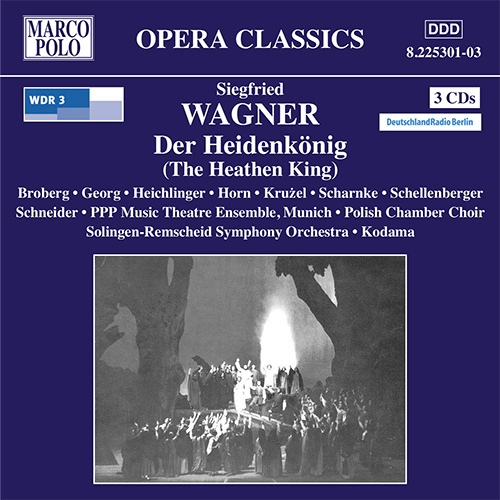WAGNER, S: Heidenkonig (Der) (The Heathen King)
Tracklist
Wagner, Siegfried - Lyricist
Georg, Mechthild (contralto)
Heichlinger, Andres (bass)
Wenhold, Andre (bass-baritone)
West German Radio Symphony Orchestra (Orchestra)
Hoffmann, Achim (baritone)
Scharnke, Thorsteen (tenor)
Schellenberger, Dagmar (soprano)
Broberg, Rebecca (soprano)
Kruzel, Adam (baritone)
Muller, Beate Maria (soprano)
Hoferichter, Philipp (tenor)
Horn, Volker (tenor)
Hochbauer, Joachim (bass)
Maier, Christine (soprano)
| 1 | Prologue: Ich hor’ sie schon, dort nah’n sie! (Monch, Volk, Wera, die Waidelottin, Kriwe-Kriweito, Krodo, Waidelottin) | 16:30 |
Georg, Mechthild (contralto)
Heichlinger, Andres (bass)
Wenhold, Andre (bass-baritone)
West German Radio Symphony Orchestra (Orchestra)
Hoffmann, Achim (baritone)
Scharnke, Thorsteen (tenor)
West German Radio Symphony Orchestra (Orchestra)
Schellenberger, Dagmar (soprano)
West German Radio Symphony Orchestra (Orchestra)
Broberg, Rebecca (soprano)
Scharnke, Thorsteen (tenor)
Kruzel, Adam (baritone)
West German Radio Symphony Orchestra (Orchestra)
Heichlinger, Andres (bass)
West German Radio Symphony Orchestra (Orchestra)
Kruzel, Adam (baritone)
Schneider, Karl (tenor)
Wenhold, Andre (bass-baritone)
West German Radio Symphony Orchestra (Orchestra)
Schellenberger, Dagmar (soprano)
Broberg, Rebecca (soprano)
West German Radio Symphony Orchestra (Orchestra)
Kruzel, Adam (baritone)
Muller, Beate Maria (soprano)
West German Radio Symphony Orchestra (Orchestra)
Muller, Beate Maria (soprano)
Hoferichter, Philipp (tenor)
Scharnke, Thorsteen (tenor)
Schellenberger, Dagmar (soprano)
West German Radio Symphony Orchestra (Orchestra)
Scharnke, Thorsteen (tenor)
Horn, Volker (tenor)
West German Radio Symphony Orchestra (Orchestra)
| 2 | Act II Scene 2: Also klug! Von dem durft ihr trinken (Bursche, Madchen, Waidewut, Volk, Poln. Wachtmeister, Preussen, Polen) | 13:37 |
Muller, Beate Maria (soprano)
Horn, Volker (tenor)
Hoffmann, Achim (baritone)
West German Radio Symphony Orchestra (Orchestra)
| 3 | Act II Scene 3: So - und jetzt das "ewige Feuer" entzundet! (Hoggo, Volk, Waidewut, Magd, Radomar, Hoggo, Wehklage) | 19:19 |
Scharnke, Thorsteen (tenor)
Hochbauer, Joachim (bass)
Maier, Christine (soprano)
West German Radio Symphony Orchestra (Orchestra)
Schellenberger, Dagmar (soprano)
Scharnke, Thorsteen (tenor)
Maier, Christine (soprano)
West German Radio Symphony Orchestra (Orchestra)
Heichlinger, Andres (bass)
Broberg, Rebecca (soprano)
West German Radio Symphony Orchestra (Orchestra)
Schellenberger, Dagmar (soprano)
West German Radio Symphony Orchestra (Orchestra)
| 3 | Act III Scene 3: Dort kommt sie trauernd, das Haupt verhüllt, bleich vor Gram (Radomar, Gelwa, Jaroslaw, Waidelottin, Waidelottin, Volk) | 14:16 |
Broberg, Rebecca (soprano)
Kruzel, Adam (baritone)
West German Radio Symphony Orchestra (Orchestra)
| 4 | Act III Scene 4: Bergt Euch! Sie nahen! (Jaroslaw, Waidelottin, Volk, Radomar, Poggesana, Waidewut, Bodo) | 09:05 |
Scharnke, Thorsteen (tenor)
Horn, Volker (tenor)
Heichlinger, Andres (bass)
West German Radio Symphony Orchestra (Orchestra)
West German Radio Symphony Orchestra (Orchestra)
Schneider, Karl (tenor)
West German Radio Symphony Orchestra (Orchestra)

At first a pupil of Humperdinck, it was only after a journey to the Far East, 10 years after his father’s death, that Siegfried Wagner, son of Richard Wagner, decided on a career as a musician. He served for many years at Bayreuth, from 1906 as director of the festival. In many ways he seems to have disappointed his formidable mother and equally formidable wife as much as he failed to please Joseph Goebbels.
Operas
Siegfried Wagner’s operas are concerned with German traditions, but rather those of Humperdinck than of his father. They largely explore the mysterious and magical medieval world suggested by the Brothers Grimm.
Orchestral Music
A relatively small number of orchestral works are represented by Siegfried Wagner’s symphonic poem Sehnsucht (‘Yearning’), based on Schiller. He also left a Violin Concerto, a work for flute and orchestra, a Symphony, and a second symphonic poem, Glück.































